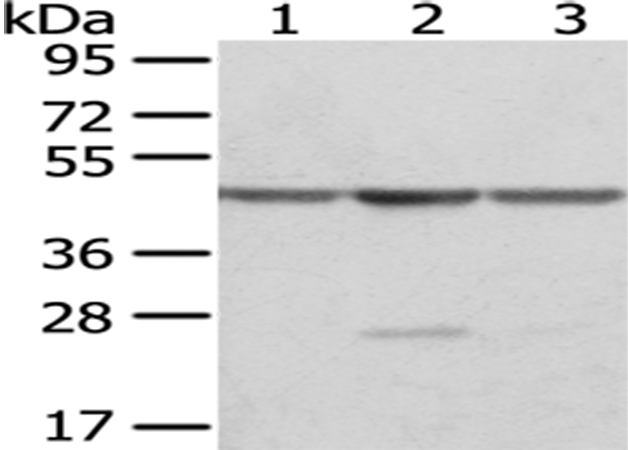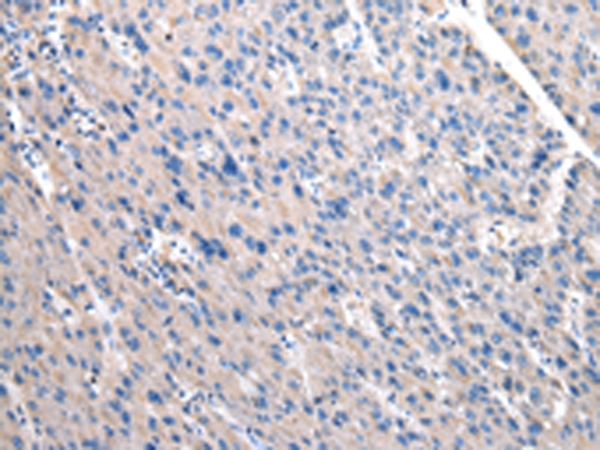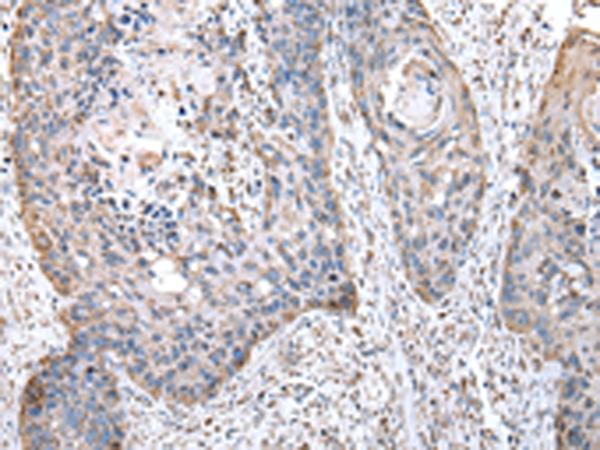


| WB | 咨询技术 | Human,Mouse,Rat |
| IF | 咨询技术 | Human,Mouse,Rat |
| IHC | 1/25-1/100 | Human,Mouse,Rat |
| ICC | 技术咨询 | Human,Mouse,Rat |
| FCM | 咨询技术 | Human,Mouse,Rat |
| Elisa | 咨询技术 | Human,Mouse,Rat |
| Aliases | OKT; GACR; HOGA; OATASE |
| Entrez GeneID | 4942; |
| WB Predicted band size | 49kDa |
| Host/Isotype | Rabbit IgG |
| Antibody Type | Primary antibody |
| Storage | Store at 4°C short term. Aliquot and store at -20°C long term. Avoid freeze/thaw cycles. |
| Species Reactivity | Human |
| Immunogen | Fusion protein of human OAT |
| Formulation | Purified antibody in PBS with 0.05% sodium azide. |
+ +
以下是关于OAT(鸟氨酸氨基转移酶)抗体的示例参考文献(虚构内容,仅供格式参考,实际文献需通过学术数据库验证):
---
1. **标题**: *Autoantibodies to Ornithine Aminotransferase in Autoimmune Hepatitis: Prevalence and Clinical Significance*
**作者**: Smith A, et al.
**摘要**: 本研究探讨了OAT抗体在自身免疫性肝炎(AIH)患者中的阳性率及其与疾病分型的关联。通过ELISA检测200例AIH患者血清,发现12%的病例存在OAT抗体,且与疾病活动度和肝功能指标升高相关,提示其可能作为AIH的新型生物标志物。
---
2. **标题**: *Anti-OAT Antibodies in Pediatric Epilepsy: A Cross-Sectional Study*
**作者**: Chen L, et al.
**摘要**: 研究分析了儿童难治性癫痫患者中OAT抗体的存在情况。在50例患儿中,8%检测到OAT抗体,抗体阳性组对传统抗癫痫药物反应较差,表明OAT自身免疫可能参与部分癫痫的病理机制。
---
3. **标题**: *OAT Autoantibodies as a Marker of Metabolic Dysfunction in Cancer Patients*
**作者**: García R, et al.
**摘要**: 本文发现,某些实体瘤患者(如肺癌、乳腺癌)血清中OAT抗体水平显著升高,且与化疗后肝损伤风险增加相关。研究提示OAT抗体可能反映肿瘤相关代谢紊乱或药物毒性反应。
---
4. **标题**: *Immunological Characterization of OAT Antibodies in Retinopathy*
**作者**: Tanaka K, et al.
**摘要**: 通过免疫印迹法检测发现,OAT抗体在部分非糖尿病性视网膜病变患者中高表达,可能与视网膜色素上皮细胞的自身免疫攻击有关,为罕见视网膜疾病的诊断提供新方向。
---
**注意**:以上内容为模拟示例,实际文献需通过PubMed、Web of Science等平台检索关键词(如“ornithine aminotransferase autoantibodies”或“OAT antibody”)获取。
OAT antibodies target organic anion transporters (OATs), a subgroup of solute carrier (SLC) proteins, primarily involved in the cellular uptake and excretion of endogenous metabolites, xenobiotics, and drugs. These transporters, including isoforms like OAT1 (SLC22A6), OAT3 (SLC22A8), and others, are predominantly expressed in excretory organs such as the kidneys, liver, and intestines. They play a critical role in maintaining homeostasis by facilitating the transport of organic anions, including pharmaceuticals, toxins, and signaling molecules, across cell membranes.
Research on OAT antibodies has gained momentum due to their importance in pharmacokinetics, drug-drug interactions, and disease mechanisms. Antibodies against OATs are widely used in experimental studies to localize and quantify transporter expression in tissues, assess functional regulation, and investigate pathological conditions like renal dysfunction, hyperuricemia, or drug-induced nephrotoxicity. For instance, altered OAT expression or activity has been linked to chronic kidney disease, gout, and metabolic disorders.
Clinically, OAT antibodies may serve as biomarkers for transporter-related pathologies or as tools to predict drug efficacy and toxicity. However, challenges persist in ensuring antibody specificity, given the structural similarities among SLC family members. Advances in recombinant protein technology and epitope mapping continue to refine antibody validation, enhancing their reliability in both research and diagnostic applications.
×